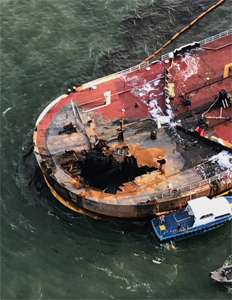The Occupational Safety and Health Administration (OSHA) has ordered Bouchard Transportation Co. to compensate a barge worker who the agency said was illegally fired after reporting safety concerns to the Coast Guard.
OSHA’s decision, made public in December, followed the deaths of two Bouchard employees when barge B. No. 255 exploded off Port Aransas, Texas, on Oct. 20, 2017. A brother of one of the victims claimed Bouchard fired him after the incident for cooperating with investigators. The employee was not identified in keeping with OSHA policy.
“Bouchard Transportation Co. — a petroleum barge company based in Melville, N.Y. — and its officers violated the whistleblower protection provisions of the Seaman’s Protection Act (SPA) when it retaliated against a seaman who cooperated with U.S. Coast Guard,” OSHA said.
Investigators from the agency’s Whistleblower Protection Program concluded that actions taken by the company, President and CEO Morton S. Bouchard III, Brendan Bouchard and Kevin Donohue “constituted retaliation … and would dissuade a reasonable seaman from reporting safety issues.” Brendan Bouchard is vice president of sales and operations; Donohue is chief operating officer.
Bouchard Transportation did not respond to requests for comment.
In a report released in May, the National Transportation Safety Board (NTSB) concluded that the fatal explosion and fire on B. No. 255 — part of an articulated tug-barge unit with the tugboat Buster Bouchard — was the result of a lack of effective maintenance and safety management by Bouchard Transportation. The agency said the explosion was caused by the ignition of flammable vapor that formed in a void space. The vapor was from crude oil that leaked into the space from the No. 1 port cargo tank through a corroded bulkhead.
Two barge crewmembers who were on the bow — Zachariah Jackson, 28, and Du’Jour Vanterpool, 26 — were killed. About 2,000 barrels of crude oil spilled from the barge or was consumed in the ensuing fire. The barge sustained more than $5 million in damage and was scrapped. The tugboat was not damaged. The NTSB concluded that Coast Guard inspectors who examined the barge prior to the incident failed to identify unsafe conditions.
Under the SPA, reporting alleged violations of maritime safety laws and regulations, cooperating with Coast Guard safety investigations, and furnishing information about a maritime casualty resulting in death are protected activities.
The seaman engaged in protected activity beginning several days after his brother’s death, OSHA said, and was fired just over three months later. The company gave him no reason for the termination on Jan. 31, 2018.
OSHA preliminarily ordered Bouchard to pay the seaman:
- Back pay with interest plus compensatory damages for losses to his 401(k).
- An additional two years of lost wages in lieu of reinstatement.
- At least $50,000 for emotional distress, pain and suffering, loss of reputation, and mental anguish.
- At least $200,000 in punitive damages for the company’s “reckless disregard for the law and callous indifference for seamen’s rights under the SPA and egregious conduct.”
OSHA ordered Bouchard to refrain from making “any adverse statements with respect to the seaman’s termination and/or any of the facts at issue in this case.”
Bouchard was also instructed to train its managers and employees about seamen’s rights under the SPA without fear of retaliation, and provide proof of the training to OSHA within 60 days of receiving the preliminary order.
“This case revealed troubling safety violations in the wake of a seaman’s death, and it exemplifies how a culture of intimidation can have disastrous results for seamen,” OSHA Regional Administrator Richard Mendelson said. “Employers and vessel owners must know and respect that the Seaman’s Protection Act safeguards seamen’s cooperation with (the Coast Guard) and other safety investigations and the reporting of safety concerns.”

